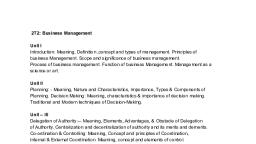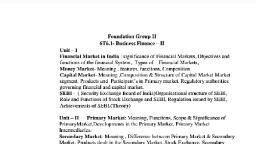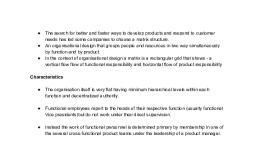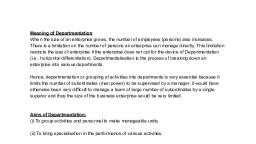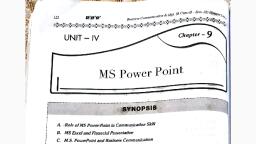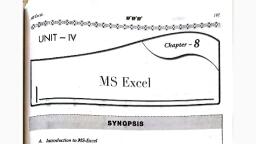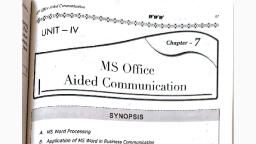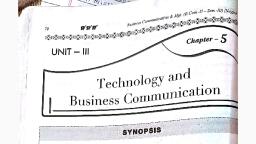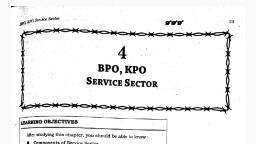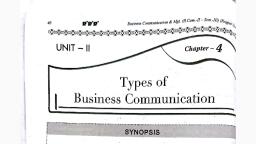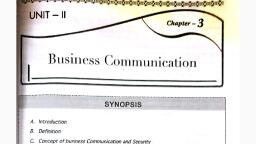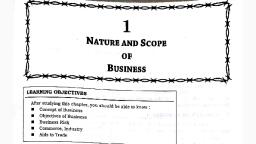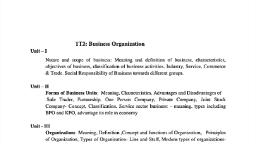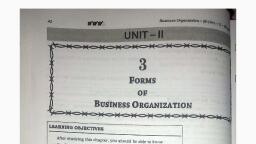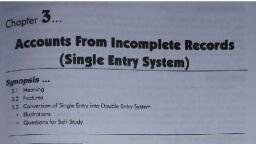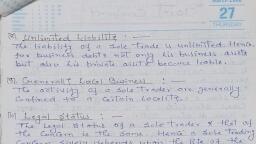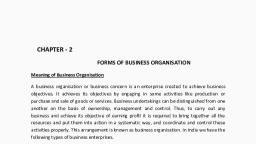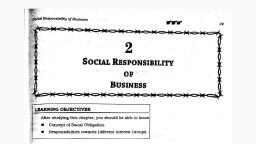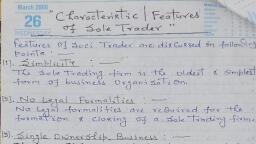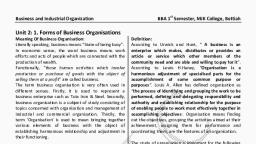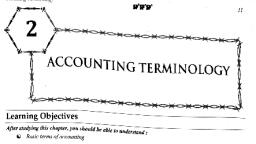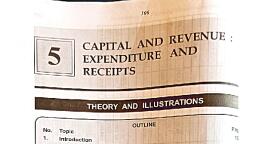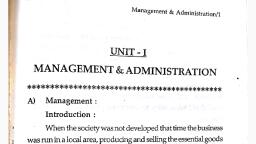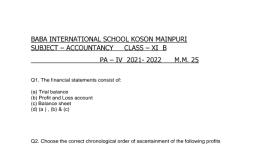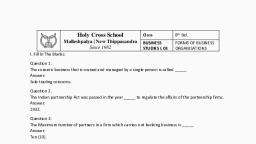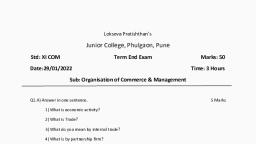Page 1 :
Business Organization- (B.Com.-)-(Nag, 42, UNIT-II, XOXOX, 3, FORMS, OF, BUSINESS ORGANIZATION, LEARNING OBJECTIVES, After studying this chapter, you should be able to know :, Forms of organisation., Features of organisation., Merits & demerits of business organisation., SYNOPSIS, Introduction, 1. Sole Trader, 2. Partnership, 3. Joint Stock Company, 4. Key Terms, 5. Exercises, 3eisd el ano, Scanned by CamScanner
Page 2 :
Forms of Business Organization, 5,5,6, 43, INTRODUCTION, In the last chapter, we have studied an overview of 'business organizations'., The various forms of organizations have emerged due to the growth in human, civilisation. Now, in this chapter, we propose to study 'Sole Trader' as a form of, organization, its features, merits and limitations., 1. SOLE TRADER, 1.1 Meaning and Definition, A sole trading concern is one of the oldest and the simplest form of business, organizations. It consists of only one person who owns the entire business. He, uses his own skill, intelligence and labour for his exclusive benefit. At times, he, may employ some employees to help him in the conduct of business. But he does, not have any partner in business., The business is solely owned, controlled and managed by one individual who, represents himself as the owner, controller and the manager of the business. He, invests his own savings and borrows from his friends and relatives and meets the, capital requirements., He alone enjoys the entire profits or bears the risks and losses. He represents, all the factors of production, i.e., land, labour, capital and organization., He is free from external interference. He takes all the decisions alone. His, success or failure entirely depends upon himself., Such an individual is called as a 'Sole Proprietor' or a 'Single Entrepreneur'., A sole proprietor can carry on the business either in a portion of his, residence or in rented premises. Since he has limited capital and limited, managerial ability, he restricts the business to local or limited markets. He does, not expand the business beyond a particular limit., Sole proprietorship is an easy form of organization. There are no legal, formalities involved in its formation as in a partnership and joint stock company., He can start the business without much preparation., This type of organization has proved to be suitable in businesses like, tailoring, carpentry, newspaper agency, tobacconist, and other forms of retail, dealings and in occupations rendering direct services. In India, agriculture is still, largely looked after by peasant proprietors., The sole trader obtains his initial capital from his own savings, he may, increase his capital by borrowing from a bank, if he is able to offer acceptable, security. He usually obtains his supplies from a wholesaler who allows him a, short period of credit in order that he may sell the goods. He uses his personal, relations in business and attracts the customers with his own goodwill and, reputation. He can pay personal attention to the customers and render better, customer services., As there is nobody else to share either profit or loss of his business, he is, more vigilant and sincere. Thus, there exists a direct relationship between efforts, and rewards., His legal liability is unlimited. He is solely liable for repayment of all the, debts. His liability covers all his possessions. All in all, in this type of business, organization, the sole trader is the sole promoter, owner, controller, manager,, and risk-bearer all rolled into one. Hence, this type of business is sometimes, called a 'one-man show'., Definition, The Webster's dictionary defines "sole" as acting, working etc. alone without, help, not shared or divided., 4/B.Com.-I - Business Organization - (Sem.-I) – (Nagpur Uni.), Scanned by CamScanner
Page 3 :
Business Organization - (B.Com. - I)- (Nag. Uni., 44, The Dictionary of Commerce and Economics by J.L. Hanson defines a s., Proprietor as under :, "Sometimes known as a 'one man' business, it is a type of business unit whe, one person is solely responsible for providing the capital, for bearing the risk of, enterprise and for the management of the business.", The Encyclopedia of Business and Commerce defines a sole trading conce, as follows :, "A sole trading concern is a form of business organization, in which on, individual invests only his capital, uses his own skill and intelligence in the, management of its affairs and is entitled to earn all the profits as also is solelu, responsible for all the risks of ownership.", 1.2 Features of a Sole Trading Concern, The following are the main features of a sole trading concern:, Bird's Eye Vies, Features, Single Ownership, No Sharing of Profit and Risk, Unification of Ownership and Management, Minimum Government Regulations, Legal Status, Unlimited Status, Local business, Business Secrecy, Personal Contact, Sole Financier, Quick decision making, Complete control, Flexibility in Operation, 1. Single Ownership of Business, A sole trading concern is a one-man show. It is owned by an individual. He, owns all the property and assets of the concern. He provides the required capital., 2. No Sharing of Profits and Risks, A sole trader enjoys all the profits of the enterprise. He assumes the full, responsibility of the business. He alone bears all the losses and risks involved in, the business., 3., Unification of Ownership and Management, A sole trader, being the only owner of the business concern, possesses the, sole authority and the right to manage the business. A sole trader is the owner, and manager of the business., 4. Minimum Government Regulations, There is no special legislation for a sole trading concern, no legal formalities, are required for the formation and closing of a sole trading concern. Hence, a sole, trader is not required to observe legal formalities except the general law of the, Scanned by CamScanner
Page 4 :
Forms of Business Organization, 45, country. Any person who is of the sound mind, is a major and is not disqualified, to conduct business by any law can start business under this form., 5. Legal Status, The legal status of a sole trader and that of the sole trading concern is the, same. Legally the proprietor and his firm are identical in all business dealings., Hence, a sole trading concern solely depends upon the life of the sole trader., 6. Unlimited Liability, The liability of a sole trader is unlimited, i.e., his liability to third parties is, not limited only to the extent of his business assets. The creditors' claims have to, be settled in full, if need be, from his own private property. There is no distinction, between private property and business property. Therefore, private property can, be attached to business in case the funds fall short., 7. Generally Local Business, The activities of a sole trader are generally confined to a certain locality., Hence, the business dealings of a sole trading concern are local. This is so, because of, od a) limited capital, and, b) limited managerial ability., 8., Business Secrecy, A sole trader is not required to publish his accounts. Competitors cannot get, information about the sole trader's activities. He can maintain complete secrecy, in his business., 9. Personal Contact, A sole trader can maintain personal contact with his customers and, employees. Personal relations help growth of business., 10. Sole Financier, The capital required for the business is entirely raised by the sole proprietor., He invests his own savings in business. In case it is necessary, he may borrow, from his friends and relations or from banks or other such institutions., 11. Quick Decision making, A sole trader is not required to consult anyone while taking decisions. Hence,, he can take the decisions on the spot. It helps to exploit business opportunities, as and when they occur., 12. Complete control over business, A sole trader has complete control over his business. All decisions are taken, by him. All problems of his business are solved by him alone., 13. Flexibility in operation, A sole trader enjoys maximum flexibility in business. He can expand his, business without any difficulty. He may change the line of his business at any, time. If the situation demands he may close down his business at any time., From the above characteristics, it is clear that this form of business, organization is most suitable, where the requirements of capital are moderate,, risk involved is relatively small and where business affairs are simple and local in, character., What are the features of Sole Trading concern?, Scanned by CamScanner
Page 5 :
personal attention to them. He listens to their complaints and problems and tries, Business Organization- (B.Com. - I)-(Nag, 46, 1.3 Merits, A sole trading concern has many merits as compared to other forms.., organization which are explained as follows:, 1. Ease in formation, The establishment of any business unit on sole trading basis is a very simple, process. There is no need for any complicated statutory or legal preliminaries to, form a small-sized business unit. A formal licence from the local authority will, serve the purpose. Even routine day-to-day conduct of business is free from, interference of law. Any person who is competent to enter into contract can start, his business., 2. Promptness in Decision-making, A sole trader is not answerable to anyone. He is responsible to none but, himself. There is no external interference whatsoever. Therefore, he can take, quick decisions and prompt action for taking advantage of profit-oriented, opportunities., 3. Personal Contact with Customers, A sole trader can pay personal attention to his customers. This helps him to, maintain good relations with his customers. He can personally look after their, individual choices, likes and dislikes. He can offer personalised services, for, instance, as a retailer., Bird's Eye View, Merits, Ease information, Prompt Decision making, Personal Contact, Good Relations with employees, Business Secrecy, Direct Motivation, Personality Development, Economy and Efficiency, Diffused ownership, Better Coordination, Minimum Regulations, Flexibility, Availability of credit, Supply in remote area, Training, Encourages competition, Self employment, Effective utilization of resources, Goodwill, Regular Supply, Good Relations with Employees, A sole trader can build up harmonious relations with his employees. He pay, 4., o solve them immediately. This is how he can get willing co-operation of the, employees in making the business successful., Scanned by CamScanner
